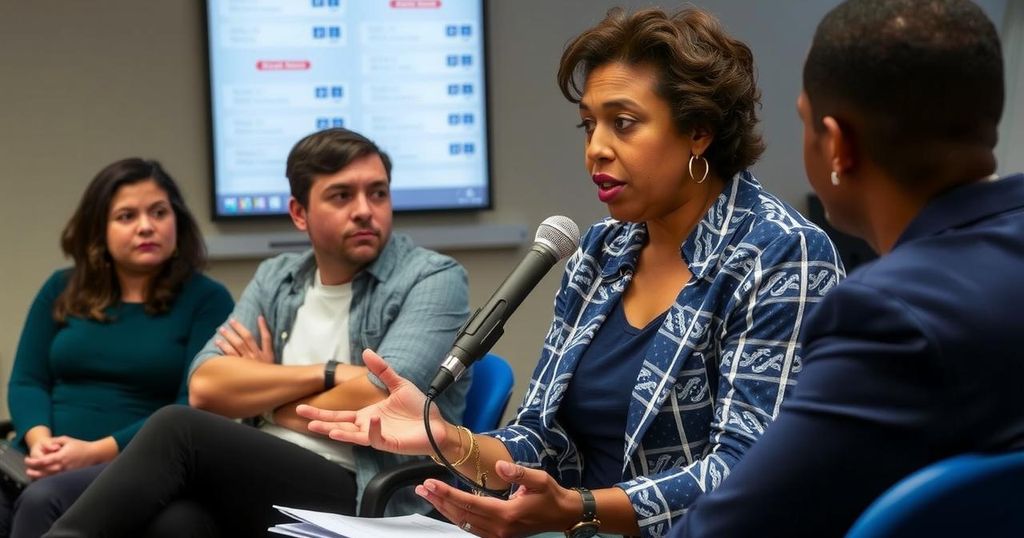Stacey Abrams Facilitates Vital Post-Election Discussion at Howard University

On November 20, Stacey Abrams, Howard University’s Ronald W. Walters Endowed Chair for Race and Black Politics, led a post-election conversation highlighting the implications of the 2024 presidential election. The dialogue emphasized civic engagement, challenges faced by Black women, and the necessity for coalition-building to protect democratic values and civil rights, urging students to take proactive roles in shaping future political landscapes.
On November 20, Stacey Abrams, the inaugural Ronald W. Walters Endowed Chair for Race and Black Politics at Howard University, facilitated a significant post-election discussion with students. The gathering, which took place in Douglass Hall, was marked by thoughtful engagement as students voiced their concerns about the 2024 presidential election and its implications for their future.
Abrams adeptly navigated the conversation, emphasizing the importance of understanding the election’s outcomes while also identifying opportunities and obligations for civic engagement. She stated, “I am someone who believes in this country’s capacity for more, even though we’ve had some trouble manifesting what it should be.” Abrams contextualized the ongoing political climate, warning against the encroachment of theocracy and championing the need for secularism in governance.
The session witnessed diverse student inquiries, some focusing on the pervasive issue of misinformation in politics and the threat posed by rising Christian nationalism. Abrams articulated the dangers of shifting towards a government rooted in evangelical Christianity, urging a collective resistance to protect the constitutional separation of church and state. “It’s the intent to shift America from its constitutional responsibility of not having established religion…” she explained.
Moreover, Abrams addressed significant political strategies, including the potential dismantling of Roe v. Wade and the implications for diversity, equity, and inclusion initiatives, indicating that any erosion of these rights could occur through gradual and insidious means. She stated, “They are doing their best to weaponize Title IX to eliminate [diversity, equity, and inclusion].” Abrams stressed the necessity for vigilance against these threats by remaining informed and engaged.
In discussing the particular experiences of Black women in the political landscape, Abrams acknowledged the feelings of exhaustion and disappointment felt by many. She commented on the overwhelming support Black women had shown for Vice President Kamala Harris, highlighting their critical role in electoral outcomes. Responding to a graduate student’s query about this exhaustion, Abrams affirmed the importance of solidarity, insisting that, “Black women are usually the most effective fighters because we are often the most targeted victim.”
Abrams’ discussion extended to the importance of coalition-building among diverse groups to promote collective interests, emphasizing that while individuals may pursue different objectives, the overarching goal of societal equity necessitates collaboration. “Coalition is shared engagement for common objectives, but not the same objective, ” she elucidated.
As the conversation concluded, Abrams encouraged students to take initiative in shaping future political narratives and strategies. She urged them to engage actively in community work, emphasizing the need for consistent civic involvement, particularly in preparation for the upcoming 2026 midterm elections. “Your obligation after you leave this room is to pick one thing and spend the next year talking about it,” Abrams advised, underscoring the power of collective action in effecting change in the political arena.
The article explores the significant role of Stacey Abrams as a leader and educator in the context of contemporary American politics. As the Ron W. Walters Endowed Chair at Howard University, Abrams convened a gathering of students to discuss the implications of the recent 2024 presidential election. The dialogue focused not only on the election outcomes but also on the larger themes of civic responsibility, political strategy, and the unique challenges faced by Black women in politics, amidst rising threats to democracy and civil rights. Abrams’ efforts highlight the importance of engagement and coalition-building within marginalized communities, aimed at fostering solidarity and effective political action.
In conclusion, Stacey Abrams’ post-election dialogue at Howard University served as a pivotal platform for engaging students in discussions about the future of American democracy, particularly in the wake of the 2024 presidential election. Through her insights on the threats posed by misinformation, potential legislative backslides, and the necessity for coalition-building, Abrams emphasized the critical role of civic engagement and collective action in shaping a more equitable society. This gathering reiterates the importance of youth involvement in politics and the responsibility of the next generation to advocate for their rights and the rights of others.
Original Source: thedig.howard.edu








